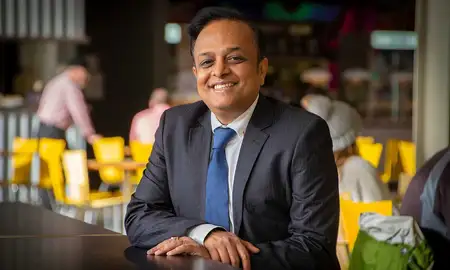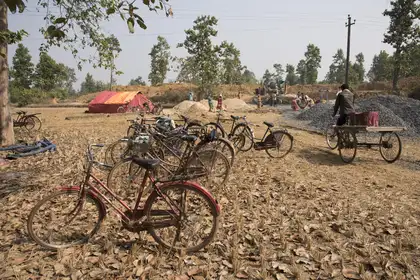
A mispronounced name is reflective of the micro practices of communication that constitute the racist structure of whiteness in settler colonial spaces.
The recent Gaurav Sharma fiasco has rendered visible the cultural incompetence of mainstream political and media infrastructures in struggling to pronounce his name.
Everyone deserves to have their names pronounced correctly and, in this case, the mispronunciation has triggered a reporter and a diversity consultant of Indian descent to write opinion pieces on what it reflects about racism toward and inclusion of Indians in Aotearoa. One of these pieces was written by Melanie Sharma-Barrow for Stuff and the other by 1 News reporter Vandhna Bhan.
In a white paper co-written with the activist and the Green Party Member of Parliament Teanau Tuiono, Professor Dutta has foregrounded the vitality of decolonising anti-racist strategies that look to whakapapa as the basis of building solidarities by carefully noting the differences and simultaneously seeking connections. Critical conversations on racism, inclusion, and anti-racist strategies should be anchored in intersectional analyses that dissect the intertwined complexities and layers of power that control exclusions, erasures, and marginalisation. Moreover, any expression of inclusion in Aotearoa of and among ethnic communities ought to be rooted in allying with Māori struggles for decolonisation.
These intersectional complexities are magnified in the Indian diaspora. Any discussion of mispronounced Indian names should first begin by acknowledging the multiple languages and dialects spoken across India and the diaspora. This means any one name or word can be pronounced differently, depending on the region, the local language, and the cultural context. It also means recognising the imposition of Hindi and Sanskritisation pursued by the Hindutva regime at the cost of erasing regional languages and the plural fabric of India and the diaspora.
Second, any such kōrero on pronouncing names is incomplete without attention to the interplays of caste and class in the politics of names of Indian descent. This is especially important in the Indian diaspora, where these complexities are largely invisible to non-Indians. An Indian would tell you where a person belongs in the caste hierarchy by looking at your last name. For instance, the last names Sharma and Bhan typically signal identities as Brahmins. Our last names, Dutta and Samant, also point to our caste privileges, embodying contexts that have shaped our location within the social structure, both in India and here in Aotearoa. Even though we might claim post-caste identities, intergenerational histories of casteism have shaped our social position.
In India, surnames carry within themselves economic, political, and social histories, constituting the politics of touch and space. As markers of identity, they define the rules of relational and community interactions, determining the hierarchy of inclusion and exclusion. They shape the spheres of everyday ties, access to resources, and pathways of mobility.
A Dalit (reference to oppressed caste) or a Muslim surname can limit your opportunities at education, finding a job, and finding a house. A Dalit surname can get you raped or killed for breaking caste boundaries.
For the Indian diaspora, a name, particularly the last name, signals a great deal. Caste forms the infrastructure of organising in the Indian diaspora, evident in caste discrimination in modern global technology organisations such as Google and Cisco Systems, and reflected in workplace discrimination, pay inequity and lack of access to job mobility in India and the West. Histories of familial privilege or marginalisation, depending upon what caste one belongs to, shape in/access to pathways of mobility. Apple recently banned caste discrimination across the corporation and will train managers to recognise it.
Thus, analyses that interpret mispronunciation of Indian last names as “othering,” without the contexts of language chauvinism and casteism, fail to grapple with the intersectional racism that shapes struggles against marginalisation in the Indian diaspora, and run the risk of reproducing superficial multiculturalism that paradoxically perpetuates the whiteness of the settler colonial state. In the rest of this piece, we will explore exactly what is at stake with simplistic analyses of Indian names as the bases for advocating for inclusion. We will anchor our analysis in conversation with Tangata Tiriti (New Zealanders of non-Māori origin) in Aotearoa.
In her piece, Bhan assumes that Sharma is a Hindi only surname; that there is only one correct way to pronounce Sharma; and that is in Hindi, thus disavowing the inherent linguistic diversity of India. The article holds up the architecture of Hindi imperialism that forms the universe of Hindutva in contemporary India. Hindutva, the fascist right-wing political ideology of Hindu nationalism, works through the imposition of monolithic Hindi language, cultural norms and practices as the cultural script for Hindus, and more broadly Indians.
The article goes on to compare te reo Māori with Hindi, claiming that the phonetics are similar, with the implicit suggestion that our cultures are connected.
It asks, “If you can roll the r in kia ora, Aotearoa, Māori, tamariki, rangatahi, and Tāmaki Makaurau (just to name a few), then you can say Sharma correctly.” The equivalence drawn to te reo Māori as the basis for advocating correct pronunciation erases the complexities of whakapapa in Aotearoa, obfuscating the textures of power that constitute the relationships of ethnic settlers with tangata whenua. Moreover, such superficial comparison to te reo to advocate for correct pronunciation in Hindi erases the oppressions Māori experienced with the colonial erasure of te reo and the Māori struggles to secure the cultural right to te reo.
The statement “As a country we’re starting to put a lot more effort into pronouncing te reo Māori correctly, as we should” undermines the status of te reo as the language of the tangata whenua and one of the three national languages of Aotearoa. As Tangata Tiriti, it is incumbent on all of us to speak the reo, not just put in effort. Also, just because one speaks te reo, it does not mean they should be able to pronounce Hindi correctly. Within the Indian diaspora, a Bengali or Malayalee may be fluent in te reo Māori but might not know Hindi because they never needed to. Creating binaries of English versus Hindi and referring to te reo as the other while being tauiwi (non-indigenous New Zealanders) overlooks the struggles of tangata whenua.
Moreover, the linkage with indigeneity suggested here is significant in the context of the Hindutva project, both in India and in Aotearoa. The notion that Hindus are as indigenous to India as Māori are to Aotearoa is a powerful myth, when the fact is that the multiple adivasi (indigenous) peoples of India have their own cultures and civilisations outside of Hinduism which are now being both erased and co-opted by Hindutva, keen to get their hands on the mineral rich traditional lands and forests and to consolidate pluralisms under the umbrella of a monolithic Hindu culture. The claim to indigeneity by Hindutva forms the basis of its othering of Muslims, legitimizing the hate and violence targeting Muslims in India and Indian Muslims in the diaspora.
In the Stuff article, “What a mispronounced name says about our attitudes to a 'rogue' MP,” Melanie Sharma-Barrow suggests Gaurav Sharma is being otherised through the mispronunciation of his forename. Referring to Sharma’s forename, the article suggests that getting a name right is the first step toward building trust in an intercultural interaction. What is missing here is an analysis of the plural forms and diversity of names in Indian contexts. The same name “Gaurav” can be pronounced in multiple ways, depending on the linguistic community one comes from. It may well be that the MP Gaurav Sharma attaches his identity to Hindi, but the acknowledgment of this diversity is critical to an article on diversity and inclusion.
Also worth noting here is the narrative of model minority mobility in the article that obfuscates the ways in which merit and mobility in the Indian diaspora are deeply intertwined with caste-class privilege. It implies that Gaurav Sharma deserves his name to be spelt and pronounced correctly because he has succeeded as a model minority, going on to list his accomplishments that count to caste privileged Indians. The author then goes on to bracket Sharma with the right-wing UK politician Rishi Sunak, claiming “no matter how much you achieve, your heritage will be used against you, like a bucket of cold water, to try to put your passion out.” We can’t help but observe here the convergence with the casteist notions of deservedness espoused by Rishi Sunak who wants to keep illegal immigrants out of UK and targets welfare recipients.
The article by Sharma-Barrow finds it disappointing that prominent people of the Indian community have not spoken up about Gaurav Sharma. Who are such prominent people of the Indian community Sharma-Barrow is referring to, given the workings of caste-class privilege in the organising of Indian diaspora here in Aotearoa? She then urges Indian Kiwis to engage in advocacy so their children can lead ‘included lives as adults’ in Aotearoa. It is worth interrogating the ways in which identitarian appeals to multiculturalism that are based on a cultural identity perpetuates erasure.
The whakapapa-based approach to anti-racism and diversity we discussed earlier suggests that our advocacy for our migrant children to lead included lives ought to be based on decentering our own privileges within the Indian diaspora in Aotearoa.
Foregrounding caste and class in our analyses is a critical starting point toward building an inclusive Aotearoa where our children can create and inhabit spaces of solidarity with the Dalits and Muslims of the Indian diaspora who have systematically experienced erasure and marginalisation. Moreover, foregrounding caste in our advocacy is a critical starting point to acknowledging the painful textures of inequalities that have historically shaped exclusions in the diaspora. This also turns to the labour of building infrastructures for voice where Dalits and Muslims can participate in shaping the conversations on anti-racism, where they are supported and held up by allies in the diaspora.
Any discourse of racism in Aotearoa ought to turn toward whakapapa as the basis for theorising the racism of the settler colonial state that systematically disenfranchises Māori and Pacific communities. As Tangata Tiriti, our anti-racist mahi must build solidarities with Māori and Pacific struggles, allying with oppressed communities and participating in their struggles. Anti-racist kōrero remains superficial without closely looking at the layers of oppression, or examining critically one’s privilege that is intertwined with having a voice.
Both authors raise important questions that demand inclusion of Indian descent people in Aotearoa New Zealand. However, our analysis suggests neither article engages with the complexities of an intersectional anti-racist politics.
Neither of the opinion pieces we analyse here ask the substantive questions we ought to be asking Labour in the context of its relationship with the wider South Asian community. What is it about the candidate selection processes of Labour that bring up upper class, upper caste Hindus as members of parliament? What strategies has Labour put in place to build solidarities with working class South Asians? What strategies has Labour put in place to build solidarities with Dalit and Muslim Indians in Aotearoa? To what extent does the shallow multiculturalism and the neoliberal ideology of Labour coupled with its convenient vote bank politics, produce casteist, supremacist, regressive representations of the Indian community while disregarding the everyday challenges of South Asian migrants?
We reiterate that while everyone deserves to have their names pronounced correctly, one cannot ‘leave aside the politics’, as Bhan suggests, that constitutes discourse in the first place. Caste privilege and language chauvinism are part of the discursive registers in Aotearoa that often obfuscate actual issues affecting communities such as exploitation of migrant South Asian workers, trafficking of students, poor working conditions in industries, struggles of our gender diverse youth in the diaspora, experiences of caste discrimination negotiated by Dalits in Aotearoa, and the rampant Islamophobia experienced by Muslim Indians.
We turn to the whakapapa-based approach offered by Tuiono and Professor Dutta to suggest that conversations on racism, diversity, and inclusion ought to be approached through the lens of Te Tiriti o Waitangi, recognising diverse and intersectional forms of discrimination and othering, decentering our privileges as advocates and activists with access to communicative spaces, seeking to draw out the connections between diverse registers of marginalisation to build anti-racist frameworks anchored in solidarity, and co-creating solidarity-based voice infrastructures.
This opinion piece is emergent out of the activist-academic collaborative experiments carried out at the Center for Culture-Centered Approach to Research and Evaluation (CARE), drawing on Professor Mohan Dutta’s scholarly work with culture-centered deconstruction of discourses of racism, empire and colonialism, and building voice infrastructures at the “margins of the margins”.
Dr Sapna Samant participated in dialogue with CARE based on her activist work in Aotearoa New Zealand against Hindutva as a member of Aotearoa Alliance of Progressive Indians and Hindus for Human Rights.
Related news
Professor Mohan Dutta recognised with Bridge Award
The International Crisis and Risk Communication Conference, ‘Bridging the Gaps’ has awarded Professor Dutta the Bridge Award for Excellence in Connecting Crisis and Risk Communication Research.
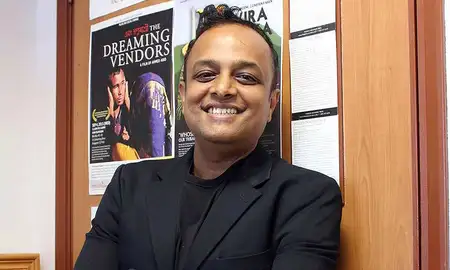
Opinion: The right-wing version of academic freedom and communicative inversions
By Professor Mohan Dutta
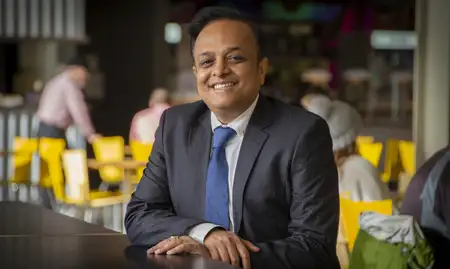
Professor Mohan J. Dutta recognised as Distinguished Scholar
Professor Mohan J. Dutta has been named as a 2021 Distinguished Scholar by the National Communication Association (NCA).
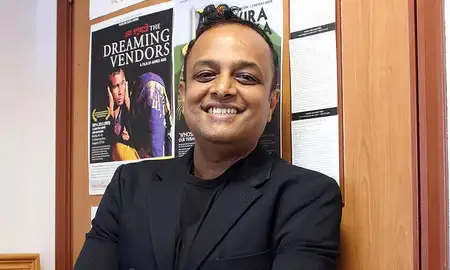
Professor Dutta’s “tireless advocacy” recognised with Aubrey Fisher Mentorship Award
Professor Mohan J Dutta, from the School of Communication, Journalism and Marketing, has been named as the 2021 Aubrey Fisher Mentorship Award winner.
